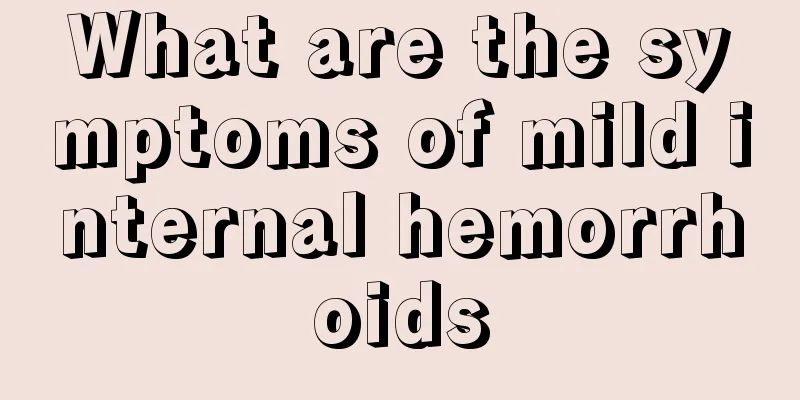What are the symptoms of mild internal hemorrhoids

|
Mild internal hemorrhoids are actually a type of hemorrhoids, but the symptoms are relatively milder. We must also treat mild internal hemorrhoids in a timely manner, otherwise it will easily lead to other diseases. Now let’s take a look at the symptoms of mild internal hemorrhoids. 1. Blood in the stool. The characteristic is painless and intermittent discharge of bright red blood after defecation, which is also a common symptom of mixed hemorrhoids and internal hemorrhoids in the early stage. Sometimes there is a small amount of blood on the surface of the stool, and sometimes it is dripping blood or spurting blood. Because feces abrades the mucosa, or because of excessive force during defecation, the pressure in the blood vessels increases, causing varicose veins to rupture, resulting in spurt-like bleeding during defecation. Long-term and repeated bleeding, or multiple heavy bleeding, can also cause anemia. 2. Pain: The early symptoms of simple internal hemorrhoids are generally painless, and sometimes only a feeling of heaviness in the anus or difficulty in defecation. If the hemorrhoids are inflamed and swollen, there may be thrombosis or incarceration in the hemorrhoids, which will cause pain; if they are prolapsed and not repositioned in time, the pain will worsen; if incarceration occurs, there will be ulceration and necrosis, causing inflammation and edema of the anal margin, the pain will be severe and the patient will be restless. 3. Early symptoms of internal hemorrhoids include mucus discharge: the rectal mucosa is stimulated by hemorrhoids for a long time, causing increased secretions; in the late stage of internal hemorrhoids, secretions often flow out of the anus due to relaxation of the anal sphincter. In mild cases, it will flow out during bowel movements, and in severe cases, it will flow out naturally even without bowel movements. When internal hemorrhoids prolapse, there will be more discharge. 4. Itching is also an early symptom of internal hemorrhoids: due to the stimulation of secretions or prolapsed hemorrhoids, the area around the anus becomes damp and unclean, causing eczema and itching. The itching sometimes persists for a long time due to the repeated effects of prolapse of internal hemorrhoids. 5. Internal hemorrhoid attack: The early symptoms of internal hemorrhoids are usually mild and painless. They will be aggravated if there is constipation or diarrhea, which is called internal hemorrhoid attack. When internal hemorrhoids occur, the hemorrhoids suddenly swell, protrude, burn, and hurt, and feel throbbing and like a foreign object. Due to the squeezing of dry and hard feces, hemorrhoids are prone to infection, ulceration and bleeding, and the attack usually lasts 3 to 5 days. If treated properly, the swelling will gradually disappear and the blood clot will be absorbed. Hemorrhoids can soften and shrink. However, due to infection, suppuration, ulceration or obstructed blood circulation, hemorrhoids may become necrotic, making the condition worse. |
<<: What is the best way to whiten fluorosis teeth
>>: What is the reason for facial paralysis caused by air conditioning
Recommend
What are the methods for differential diagnosis of liver cancer
In recent years, liver cancer has become one of t...
Can melanoma be transmitted to each other?
When hearing about some malignant diseases, many ...
Moles get bigger, be alert to mole changes
If you find that a mole on a certain part of your...
Can late-stage melanoma be cured?
Can late-stage melanoma be cured? The incidence o...
The effect of skin care cream
Nowadays, the environment in which people live is...
What are neurotransmitters?
Human life activities require neural regulation, ...
The reason for leg cramps when sleeping is because of this
Many people may have experienced leg cramps at ni...
What is the reason for dry throat and thirst
The main reason for dry throat and thirst is that...
Home-cooked food therapy to help gastric cancer patients relieve bloating and strengthen the stomach
Gastric cancer is a malignant tumor of the digest...
What to do if you have a chickenpox headache
Chickenpox is a highly contagious disease and als...
How to prevent hair loss and regrow hair?
In our daily life, we often see some friends with...
What are the causes of bone cancer
In recent years, bone cancer has become one of th...
What causes enteritis?
Nowadays, many teenagers suffer from enteritis. M...
The role of polydextrose in milk powder
Polydextrose is a type of dietary fiber and is al...
What is the best match for Job's tears
Job's tears can be eaten with many kinds of f...









